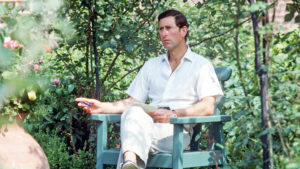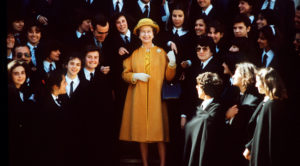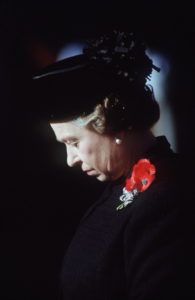To reach the King’s vision for modern Britain, first you must travel through his kingdom. Take a delayed train from London down to the south coast. Turn right at the docks outside Southampton, past a wasteland of Chinese shipping containers, and towards the county town of Dorchester. Leave the station, walk past a tired Costa Coffee, and a geriatric bus will ferry you out of town, past tilting rows of sad post-war council houses, until you reach open fields. Ahead, a Leninesque statue of the Queen Mother comes into view. You are now in Poundbury.
Since his ascension, King Charles and his model community have become an unlikely source of inspiration for those jaded by modern politics. A honeymoon of praise has flourished around the King’s idiosyncratic, anti-modernist philosophy concerning life, work and nature. All of this has largely focused on his experimental community on the outskirts of Dorchester. And this buzz has even worked its way to the lips of Michael Gove, the minister responsible for revolutionising Britain’s housing stock, who this week rhapsodised about Poundbury’s beauty and vision.
Poundbury was conceived in the late Eighties when a section of the Duchy of Cornwall estate was confronted by Dorset County Council with new house-building targets for lower-income families. Today, it has a community of 4,600 people, up to half of whom find employment in the town, living in new-build properties so eye-pleasing they couldn’t possibly have been built this century.
“People often come here sceptical and end up changing their minds,” says Blake Holt of the resident’s association, which, unlike most such groups, is more accustomed to promoting the town’s ethos than solving neighbourly disputes. Blake talks me through the sustainability, social integration, and “harmony” between man and his environment that Charles and his architect Leon Krier have built into every shop front, front door, flowerbed and fountain. With empty words like sustainability too often thrown at us, it’s intriguing to actually see them in action. Blake talks of the local factory, the anaerobic digester plant that covers most of the town’s energy needs, and the Duchy’s commitment to having 35% of housing as “affordable”. He speaks of the many who have come here, from ministers to amateur mystics, in search of some sort of alternative to the reality of living in England in the 21st century.
Not all are convinced. The New Yorker’s profile of the town from September got tied up in a Truman Show analogy after it questioned what “the best of the United Kingdom’s past” could really “tell us about its future”. “Architectural visionary, or regressive Nimby?” asked The Times in a recent reappraisal of the King’s take on architecture that saw the town described as a “nostalgic vision”. This was how Poundbury was widely interpreted after Charles’s ascension: a sad, backward refusal that fails to reckon with Britain’s present, let alone its future.
Walking through town, you can see this is all wrong. We walk past a carpet shop housed inside a building that looks like a Roman Temple, then a fountain that wouldn’t look out of place in Moorish Spain. It would be a mistake to confuse Charles’s cultural and aesthetic cherry-picking with a bygone age, let alone the values he has actively tried to install into the town. It doesn’t take long to realise that nothing like Poundbury has ever really existed in England’s past. This radical blend of conservatism, localism, environmentalism and aesthetic appreciation is more idealistic than nostalgic, more pioneering than retrograde.
We arrive at the edge of town, the clear boundary between Poundbury and Dorchester. You look back at the forgotten England, the one you normally see from a high speed train window. The disused water tower, the matchbox council housing. You start to wonder if — or even when — Poundbury could start to exist there too.
The world out there is in crisis — and not just Dorchester. Far from a beacon of innovation, Britain is fast becoming renowned as a lesson in economic stagnation and failure. Throw in the death of the Queen, a flurry of Prime Ministers and a Budget that crashed the economy, and you have a very English apocalypse. Both in the sense of such grim incompetence you can only laugh, but also in the old religious sense of the word: in the divine revelation of a truth. Surely we can’t go on like this. Something in Britain must change.
Charles, or his cheerleaders, could well argue that what he was trying to implement on the edge of Dorchester was at least an attempt to grapple with this. Poundbury isn’t about the past, it’s about a different, more cautious understanding of what is likely to be a poorer, uncertain future. Critics of Charles may sneer at his alternative to the globalised modernity he sees at the root of our problems: the idiosyncratic mix of mysticism, localism and environmentalism he laid out in his 2010 book Harmony. But as acute observers of the King’s philosophy have observed, his desire to find harmony between man and his environment is not just a sounding board for nice ideas about fewer cars, sustainable farming and pretty houses. Charles, and by extension his planning committees, is trying to grapple with a more existential question that now dominates our country’s future. When the tide of globalisation turns and the age of abundance ends, what do we really have left?
In Poundbury, there is an answer of sorts woven into the architecture and community. It’s not hard to see why so many make the pilgrimage. The King is asking questions about living, purpose and our future, and has found feasible answers compatible with a wider cross-section of British society. Meaning in community, localism and environment. Security in energy, employment and home. A culture, aesthetic and way of life in complete contrast to the globalised modernity that has dominated the country for so long. This is a language few of our politicians talk, let alone understand. Could what has worked so well for Poundbury, be scaled into the ethos of our nation? Could it tame the forces of our present and future apocalypse?
Of course, this version of our future is not without its sacrifices, something Poundbury itself has struggled with. On the other side of town, one that looks away from Dorchester and out to the rolling fields of Dorset, there is a more desired but increasingly exclusive version of modern Britain. Here, in the final stages of the town’s development, a trio of property companies are set to take advantage of the 29% premium new arrivals are willing to pay to become residents. In the Queen Mother Square, in the middle of the town, I can see a busy Waitrose, and just next to that a luxury spa. Poundbury’s vision has become a victim of its own success. Now without its founding Prince to shepherd its ethos, it’s easy to see its rising house prices take the reins. Instead of being a viable alternative for a different kind of Britain in the 21st century, much of Poundbury is fast becoming a luxury refuge for those lucky enough to afford where to see out the storm.
Here the pilgrimage must come to an end. Regardless of whether or not Poundbury will stay true to the King’s philosophy, the reality is that increasingly we will have to take seriously the vision of the future it was built to anticipate. A less gentrified form of Poundbury may provide us with an ideal of what might work in a poorer country as the tide of globalisation turns. For a country long weaned on the opposite, the path to optimal decline may well be a tough sell. It will require us and our politicians to confront a set of questions we may soon have no choice but to answer.
Can we continue to bury a forgotten England from a high-speed train window in poorly-built, isolated communities? Or can we rediscover a common purpose and identity that will allow us to forego the cultural and economic individualism of high modernity many of us may no longer be able to afford? Until we face up to these questions, we will keep returning to Poundbury.
Disclaimer
Some of the posts we share are controversial and we do not necessarily agree with them in the whole extend. Sometimes we agree with the content or part of it but we do not agree with the narration or language. Nevertheless we find them somehow interesting, valuable and/or informative or we share them, because we strongly believe in freedom of speech, free press and journalism. We strongly encourage you to have a critical approach to all the content, do your own research and analysis to build your own opinion.
We would be glad to have your feedback.
Source: UnHerd Read the original article here: https://unherd.com/





